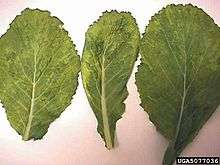Turnip mosaic virus
| Turnip mosaic virus (TuMV) | |
|---|---|
 | |
| Leaves showing interveinal chlorosis, puckering and distortion. | |
| Virus classification | |
| Group: | Group IV ((+)ssRNA) |
| Family: | Potyviridae |
| Genus: | Potyvirus |
| Species: | Turnip mosaic virus |
| Synonyms | |
| |
Turnip mosaic virus (TuMV) is a Potyvirus of the family Potyviridae that causes diseases in cruciferous plants, among others. The virus is usually spread by 40-50 species of aphids in a non-persistent manner. Infected plants, especially the natural hosts, show symptoms such as chlorotic local lesions, mosaic, mottling, puckering or rugosity. TuMV is a positive-sense single stranded RNA virus, consisting of a non-enveloped, helical capsid that is filamentous and flexuous, with an average length of 720 nm. The TuMV genome is linear and monopartite (single particle). The virus has a thermal inactivation point (TIP) of 62°C, and longevity in vitro (LIV) of 3–4 days.
External links
This article is issued from Wikipedia - version of the 2/25/2014. The text is available under the Creative Commons Attribution/Share Alike but additional terms may apply for the media files.